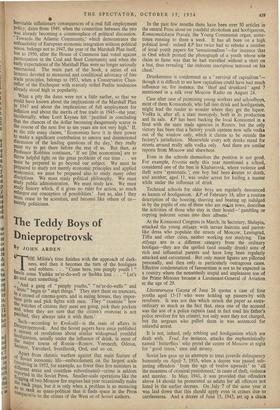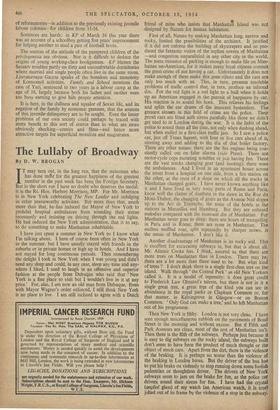The Teddy Boys of
bniepropetrovsk
JOHN ARDEN HE Militia's time finishes with the approach of dark- ness, and then it becomes the turn of the hooligans and robbers. . . . " Come here, you pimply youth I " bawls some Yashka ne'er-do-well or Sashka lout . . . " Let's go and start something."
"louts And a gang of " pimply youths," " ne'er-do-wells " and louts " begin to " start things." They start them on tramcars, ,111 a crowd of cinema-goers, and in eating houses, they impor- tune girls and pick fights with men. They " examine " how the watches of citizens they meet are going, pick their pockets and when they are sure that • the citizen's overcoat is not Patched, they always take it with them.' , Such—according to Krokodil—is the state of affairs in A uniepropetrovsk. And the Soviet papers have since published astream of revelations about similar widespread youthful hooliganism, ..aoliganism, usually under the influence of drink, in most of a the major towns of Russia—Rostov, Voronezh, Odessa, rid uaratov. Yaroslavl, Sverdlovsk, Orel, and so on. D I Apart from chronic warfare against that main feature of roe of Soviet economic life—embezzlement on the largest scale in (involving in 1952, for example, no fewer than five ministers in Ina different areas and countless subordinates)—crime is seldom e th ripened in the Soviet Press. Smaller-scale operations like the `Lie k at. tkeiggbilalc8of two Moscow fire engines last year occasionally make the jo iciso to rank as quasii-tpolitical wthhaetnita fipnrdosblespmacies sino the Press1 ' inparable to the crimes of the West or of Soviet authors. In the past few months there have been over 50 articles in the central Press alone on youthful alcoholism and hooliganism, Komsomolskaya Pravda, the Young Communist organ, some- times running to three a week. It has all been on a high political level : indeed KP has twice had to rebuke a number of local youth papers for 'sensationalism '—for instance that in Orel which printed the photograph of a youth whose sole claim to fame was that he had travelled without a shirt on a bus, thus revealing the indecent inscription tattooed on his chest.'
Drunkenness is condemned as a survival of capitalism '— though it is difficult to see how capitalism could have had much influence on, for instance, the thief and drunkard' aged 7 mentioned in a talk over Moscow Radio on August 24.
Case after case of promising young workers and schoolboys, most of them Komsomols, who fall into drink and hooliganism, might lead the reader to wonder where they 4et the liquor. Vodka is, after all, a state monopoly, both in its production and its sale. KP has been backing the local Komsomol in a feud with the state trade agencies in Rostov, but the only victory has been that a factory youth canteen now sells vodka out of the window only, which it claims to be outside the factory's jurisdiction. Meanwhile every soft drinks stand for streets around really sells vodka only. And there are similar reports from Moscow and elsewhere.
Even in the schools themselves the position is not good. For example, Izvestia early this year mentioned a school. considered one of the best in Khabarovsk, where violence and theft were 'systematic'; one boy had been beaten to death, and another, aged 11, was under arrest for knifing a master while under the influence of drink.
Technical schools for older boys are regularly denounced as haunts of hooliganism. KP of February 18, after a routine description of the boozing, thieving and beating up indulged in by the pupils of one of these who are ouisin town, describes the activities of those who stay in their hostel—' gambling or copying indecent verses into their albums.'
At the Komsomol Congress in March, its Secretary, Shelepin. attacked the young stilyags, with tarzan haircuts and parrot- like dress who populate the streets of Moscow, Leningrad. Tiflis and other cities, neither working nor studying. The stilyags are in a different category from the ordinary hooligan—they are the spoiled (and usually drunk) sons of rich and influential parents and have long been regularly attacked and caricatured. But only minor figures are pilloried personally, and then only in particularly outrageous cases. Effective condemnation of favouritism is not to be expected in a country where the notoriously stupid and unpleasant son of the Prime -Minister became a Lieutenant-General of Aviation at the age of 29.
Literaturnaya Gazeta of June 26 quotes a case of four youths aged 15-17 who were holding up passers-by with revolvers. It was not this which struck the paper as extra- ordinary so much as the fact that, since one of the accused was the son of a police captain (and in fact used his father's police revolver for his crimes), not only were they not charged, but the sergeant who pulled them in was sentenced for unlawful arrest.
It is not, indeed, only robbing and hooliganism which are dealt with. Trud, for instance, attacks the euphemistically named butterflies' who prowl the centre of Moscow at night for good times,' men and money.
Soviet law gave up its attempts to treat juvenile delinquency humanely on April- 7, 1935, when a decree was passed sub- jecting offenders from the age of twelve upwards' to all the measures of criminal punishment,' in cases of theft, violence and murder. In May, 1941, it was provided that offenders above 14 should be prosecuted as adults for all offences not listed in the earlier decrees. On July 7 of the same year it was laid down that this should apply even in crimes due to carelessness. And a decree of June 15, 1943, set up a chain
•
of reformatories:---in addition to the previously existing juvenile labour colonies—for children from 11-16.
Sentences are harsh: in KP of March 16 this year there was an account of a schoolboy getting five years' imprisonment for helping another to steal a pair of football boots.
The sources of the attitude of the pampered children of the privilegentsia are obvious. Nor is it difficult to deduce the origins of young working-class hooliganism. KP blames the Saratov troubles partly on dirty and uncomfortable dormitories where married and single people often live in the same room. Literaturnaya Gazeta speaks of the boredom and monotony of Komsomol activities. Family and School mentions the case of Yuri, sentenced to two years in a labour camp at the age of 16, largely because both his father and mother were too busy earning to give Min proper attention.
It is here, in the dullness and squalor of Soviet life, and its negation of the family by economic pressure, that the sources of this juvenile, delinquency are to be sought. Even the lesser problems of our own society could perhaps be traced with more benefit to this sort of source than to what are more obviously shocking—comics and films—and hence more attractive targets for superficial moralists and magistrates.



































 Previous page
Previous page